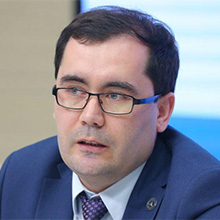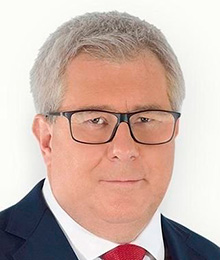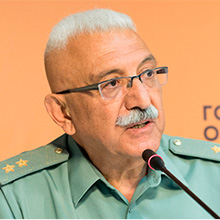
The Strategy of Actions: A Guideline for Uzbek Reforms  By Eldor TULYAKOV, Executive Director, Development Strategy Centre
By Eldor TULYAKOV, Executive Director, Development Strategy Centre
Furkat YUNUSOV, Head of Department, Development Strategy Centre
Four years ago, Uzbekistan launched reforms critical to the development of its economic sphere. Based on the Strategy of Actions, the document responsible for outlining the priorities for the country’s growth for the period of 2017-2021, as a metric we have arrived at initial finding, with several indicators demonstrating progress, most notably the areas of public administration, social and civic institutions, mass-media, economic advances, among others. The past four years have evidenced precise results and demonstrated more advanced methods to take these priority areas forward. READ MORE
- EGF Editor |
Published on EGF: 22.09.2021
| Markets
-
After 30 Years of Modern Statehood Armenia Has Little to Celebrate  By Benyamin POGHOSYAN, PhD, Chairman, Center for Political and Economic Strategic Studies
By Benyamin POGHOSYAN, PhD, Chairman, Center for Political and Economic Strategic Studies
Armenia is celebrating the 30th anniversary of its independence but whilst it has all the attributes of a modern state a lot of its institutions are hollow. There is much that can be done, and if it acts reasonably, Armenia can celebrate its 50th anniversary of independence in twenty years’ time in a much more positive atmosphere.
On 21 September 2021, Armenia celebrates the 30th anniversary of its independence. For a nation with at least 3500 years of history, this may not seem a very impressive record. However, since 1045 AD Armenia has never witnessed such a long period of independent statehood in the Armenian highland. Armenia enjoyed a brief period of independence in May 1918 - December 1920, after the collapse of the Russian Empire. However, these two and half years were marked by instability, conflicts, widespread famine, and poverty.READ MORE
- EGF Editor |
Published on EGF: 22.09.2021
| External Relations
-
Uzbekistan Presidential Election Campaign Gets Underway  By Ryszard Czarnecki, Member of European Parliament
By Ryszard Czarnecki, Member of European Parliament
Uzbek Presidential elections are scheduled to be held on October 24, 2021. These will be the sixth Presidential elections that will take place in the independent country. In the previous Presidential elections held in 2016, Shavkat Mirziyoyev emerged as the winner. Mirziyoyev is all set to run for a second term as the long ruling Liberal Democratic party will nominate him again.
Uzbekistan’s Central Electoral Commission has invited observers from the Parliamentary Assembly of the Council of Europe and the Office for Democratic Institutions and Human Rights (ODIHR) of the Organisation for Security and Cooperation in Europe (OSCE). Narzulla Oblomurodov, leader of Ecological Party of Uzbekistan; Bahrom Abduhalimov, head of Adolat Social Democratic Party, and Alisher Kadirov, chair of Democrat Party of Milliy Tiklanish (National Revival), are the other leaders who have been nominated to run for the President. READ MORE
- EGF Editor |
Published on EGF: 14.09.2021
| External Relations
-
Armenia and Turkey Try Again to Normalise Relations. This Time It May Work  By Benyamin POGHOSYAN, PhD, Chairman, Center for Political and Economic Strategic Studies
By Benyamin POGHOSYAN, PhD, Chairman, Center for Political and Economic Strategic Studies
The possible normalisation of Armenia–Turkey relations have always been in the spotlight of the South Caucasus geopolitics. Turkey recognised Armenian independence back in 1991 but refused to establish diplomatic relations, and in April 1993 closed its border with Armenia in response to the advance of Armenian forces in the first Karabakh war. Since then, Turkey has put forward several preconditions for normalising relations with Armenia: the withdrawal of Armenian forces from Karabakh, the end to the Armenian genocide international recognition campaign, and the official recognition of Armenia–Turkey borders by independent Armenia. At the same time, Armenia–Turkey relations were a part of the broader regional geopolitics. Russia struggled to regain its influence in the South Caucasus while the US viewed the emerging Turkey–Georgia–Azerbaijan strategic partnership as a critical tool to counter Russian efforts. READ MORE
- EGF Editor |
Published on EGF: 14.09.2021
| External Relations
-
Turkey Takes Advantage from Crimean Platform to Enhance Its Leverage against Russia  By Hayk KOTANJIAN, Lieutenant General (ret), Professor of RA, RF, USA (strategic security studies), Lazarev Club Board Member
By Hayk KOTANJIAN, Lieutenant General (ret), Professor of RA, RF, USA (strategic security studies), Lazarev Club Board Member
On the eve of the 30th anniversary of Ukraine, on August 23, 2021, at the initiative of President of Ukraine Zelensky, the Crimean Platform summit was held with the participation of 46 states and international organizations. The establishment of the platform with the goal of its long-term functioning was announced as one of the main events in the framework of the celebration of the 30th anniversary of independence of Ukraine. According to the President of Ukraine Vladimir Zelensky, the launch of the platform will introduce the problem of "de-occupation of the Crimea" into the international agenda on a regular political and diplomatic basis. READ MORE
- EGF Editor |
Published on EGF: 04.09.2021
| External Relations
-
The Great Game in the Levant: Russia’s Interests in Lebanon  By Yeghia TASHJIAN, Beirut-based regional analyst and researcher, columnist, "The Armenian Weekly”
By Yeghia TASHJIAN, Beirut-based regional analyst and researcher, columnist, "The Armenian Weekly”
Like other regional powers, Russia has taken major steps to advance its geopolitical interests in the Levant. With the goals of expanding its influence and control the vast energy resources in the region. Although it only has a naval military base in Tartus (Syria) and no borders on the Mediterranean Sea, Russia has managed to exert its influence around nearby countries, including Lebanon. The perception of Lebanon as part of its Syrian stake encourages Moscow to strive to capitalize on its influence in the region after intervening in the Syrian conflict. In the last few years, Russia started playing a larger role in Lebanon following the growing civil unrest in Syria and the defeat of ISIS. READ MORE
- EGF Editor |
Published on EGF: 04.09.2021
| External Relations
-
The U.S. Policy in the South Caucasus after the 2020 Karabakh War  By Benyamin POGHOSYAN, PhD, Chairman, Center for Political and Economic Strategic Studies
By Benyamin POGHOSYAN, PhD, Chairman, Center for Political and Economic Strategic Studies
The 2020 Karabakh war has significantly impacted the regional dynamics in the South Caucasus. Experts and pundits have not come yet to a unified approach regarding the reasons and implications of the war. However, many agree that the primary beneficiaries of the war were Russia and Turkey. Kremlin has reached perhaps its main goal in Karabakh – to put Russian boots on the ground, while it has also significantly increased its military presence in Armenia. Turkey has cemented its presence in Azerbaijan as now a large part of Azerbaijani society believes that without Turkey’s overt support and involvement, Baku could not win the war. Turkey also is a part of the Joint Monitoring Centre operating in the Aghdam region of Azerbaijan, though Turkey hoped to have more military involvement in the post-war Karabakh. READ MORE
- EGF Editor |
Published on EGF: 03.09.2021
| External Relations
-
Revolutionizing the Turkish Army under Erdogan  By Yeghia TASHJIAN, Beirut-based regional analyst and researcher, columnist, "The Armenian Weekly”
By Yeghia TASHJIAN, Beirut-based regional analyst and researcher, columnist, "The Armenian Weekly”
Back in July, Rich Outzen published a policy paper “Deals, Drones and National Will: The New Era in Turkish Power Projection” in the Washington Institute for Near East Policy highlighting the new strategy of the Turkish Armed Forces, the development of the arms industry and how Ankara is deploying hard power in the region. According to Outzen, the integration of drones, electronic warfare, manoeuvre and precision strike employed by Turkey across technologies and domains (manned/unmanned and ground/air/naval) have been characterized as a new phase of a revolution in military affairs (RMA). An RMA is a hypothesis in military theory about the future of warfare, often connected to technological and organizational recommendations for radical military reform. An RMA occurs when new tactics, technologies and operational concepts enable dramatic increases in ineffectiveness to provide early innovators a marked advantage and force others to adopt the same methods. READ MORE
- EGF Editor |
Published on EGF: 12.08.2021
| Security
-
